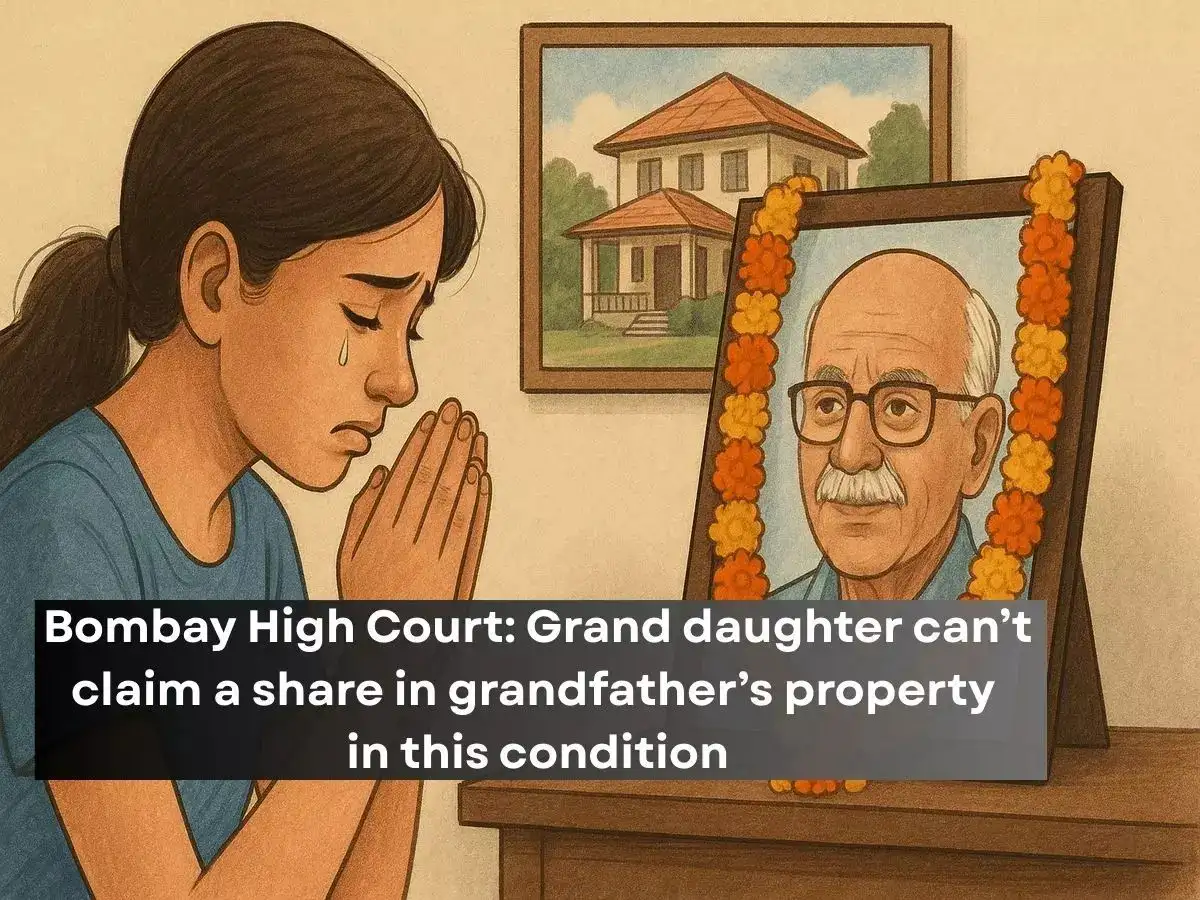Granddaughter can’t claim a share in maternal grandfather’s property in this condition, rules Bombay High Court
By Neelanjit Das
Copyright indiatimes

On September 3, 2025, the Bombay High Court rejected a granddaughter’s claim to her maternal grandfather’s ancestral property. The Bombay High Court ruled that she has no right to claim a stake in her maternal grandfather’s property because it is an ancestral property for her mother, who is alive and has a birthright to it. Income Tax GuideIncome Tax Slabs FY 2025-26Income Tax Calculator 2025New Income Tax Bill 2025In technical terms, such property is referred to as ‘obstructed heritage’ which means her right to the ancestral property will accrue only after the property owner’s death, which is in this case is her mother. Additionally, the High Court also clarified that a birthright only applies to paternal ancestral property, not to properties inherited through the maternal side, which is the situation here.This case was filed in the Bombay High Court by the granddaughter of Mr. Namdev (maternal grandfather). Namdev had four daughters and four sons. One of Namdev’s daughters is the mother of the girl who filed the case. Since both Namdev and his wife have passed away, their property and land remain undivided joint family properties of the four sons and four daughters, with each child entitled to an 1/8th share. The granddaughter argued that her maternal uncles have stopped providing agriculture yield from the land to her mother and have denied her 1/8th share in the property and the land.Her uncles said that she has filed this case in her capacity as Namdev’s granddaughter and is thus not entitled to maintain a suit for partition and claim any share when her mother is still alive and she is not claiming any partition of Namdev’s property.Read on to learn more about this judgement and the potential implications for your succession and inheritance planning.Bombay High Court decodes Section 6 of Hindu Succession Act, 1956Justice Shailesh P. Brahme of Bombay High Court in the order dated September 3, 2025 said that she (granddaughter) is claiming share in the joint family property of her maternal grandfather. The High Court said that the said lands are joint family properties of her maternal grandfather, mother, maternal side aunts and uncles and so it is necessary to examine as to whether she is a member of the coparcenary and the lands are coparcenary properties.Also read: Husband bought property for Rs 60 lakh jointly with wife; Income tax dept sent her notice for unexplained investments; she wins case in ITAT Delhi The Bombay High Court said that as per amended Section 6 of The Hindu Succession Act, 1956, a daughter is given a birth right and she is at par with son. The High Court said: “In the present matter, her mother can be said to have a birth right, but she has not filed suit for partition and separate possession. She has not made any grievance that she has been denied her share in the joint family property.”The Bombay High Court said that as per Section 6(1)(a), a daughter only can become a coparcener in her own right in the same manner as the son. The plaintiff is the granddaughter and she is not placed at par with daughter. Bombay High Court said: “As per clause (b), a daughter is given the same right in the coparcenary property. The concept of coparcenary is made clear by many decisions and lastly by the authoritative pronouncement in the matter of Vineeta Sharma Vs. Rakesh Sharma ; (2020) 9 SCC 1.”Also read: Even if you made zero capital gains income from sale of property you still need to pay tax in this situation; CA explains whyBombay High Court answers how coparcenary property is formedCoparcenary is a legal term which is used in Hindu Succession Law and it refers to a person who has the legal right in an ancestral property by virtue of birth or adoption.Also read: Get full tax exemption on sale of farm land by using this tax provisionThe Bombay High Court in this present case reproduced the relevant extracts of Vineeta Sharma Vs. Rakesh Sharma ; (2020) 9 SCC 1 judgement and said:Coparcenary property is the one which is inherited by a Hindu from his father, grandfather, or great grandfather. Property inherited from others is held in his rights and cannot be treated as forming part of the coparcenary. The property in coparcenary is held as joint owners.Coparcener heirs get right by birth. Another method to be a coparcener is by way of adoption. As earlier, a woman could not be a coparcener, but she could still be a joint family member. By substituted, section 6 with effect from September 8, 2025 daughters are recognised as coparceners in their rights, by birth in the family like a son. Coparcenary is the creation of law. Only a coparcener has a right to demand partition. Test is if a person can demand a partition, he is a coparcener not otherwise. Great greatgrandson cannot demand a partition as he is not a coparcener.In a case out of three male descendants, one or other has died, the last holder, even a fifth descendant, can claim partition. In case they are alive, he is excluded.For interpreting the provision of section 6, it is necessary to ponder how coparcenary is formed. The basic concept of coparcenary is based upon common ownership by coparceners. When it remains undivided, the share of the coparcener is not certain. Nobody can claim with precision the extent of his right in the undivided property. Coparceners cannot claim any precise share as the interest in coparcenary is fluctuating. It increases and diminishes by death and birth in the family.Thus by the above set precedent, the Bombay High Court said that in the present matter, Namdev’s lands cannot be said to be coparcenary property of her (granddaughter).Also read: He got Rs 89 lakh as gift from relatives; Tax dept doubted its genuineness, but ITAT Mumbai ruled in his favour: Here’s why The High Court said that those lands are coparcenary property of her mother but her mother is not coming forward claiming partition. She is not coparcener and suit lands are not the coparcenary properties. Bombay High Court says that this is a case of obstructed heritage propertyObstructed heritage is a technical term which means that the legal heir’s right in the property is not acquired by birth but only upon the owner’s death.Also read: Income Tax Department finds Rs 5 crore cash in his house; Know how a 2008 circular saved him from prosecutionThe Bombay High Court said that the concept of unobstructed and obstructed heritage is explained by the Supreme Court in Vineeta Sharma’s judgment. Relevant extracts from that judgement are:Property in which a person acquires an interest by birth is called unobstructed heritage, because the accrual of the right to it is not obstructed by the existence of the owner.Thus, property inherited by a Hindu from his father, father’s father, or father’s father’s father, but not from his maternal grandfather, is unobstructed heritage as regards his own male issue i.e. his son, grandson, and great-grandson.61 His male issues acquire an interest in it from the moment of their birth. Their right to it arises from the mere fact of their birth in the family, and they become coparceners with their paternal ancestor in such property immediately on their birth, and in such cases ancestral property is unobstructed heritage.Property, the right to which accrues not by birth but on the death of the last owner without leaving a male issue, is called obstructed heritage. It is called obstructed, because the accrual of right to it is obstructed by the existence of the owner. Thus, property which devolves on parents, brothers, nephews, uncles, etc. upon the death of the last owner, is obstructed heritage. These relations do not take a vested interest in the property by birth. Their right to it arises for the first time on the death of the owner. Until then, they have a bare chance of succession to the property, contingent upon their surviving the owner.Unobstructed heritage devolves by survivorship: obstructed heritage, by succession. There are, however, some cases in which obstructed heritage is also passed by survivorship.”Applying the above mentioned precedent of the Supreme Court, the Bombay High Court said that she (granddaughter) has not acquired any birth right. Therefore, there is no unobstructed heritage. She is not a lineal descendant of paternal ancestor. She is claiming partition of the lands of maternal grandfather. It’s a case of obstructed heritage.Also read: Pay more than Rs 20,000 in cash for these transactions and get ready to pay up to 100% penalty, says tax deptBombay High Court says: If the property is inherited from the paternal side then only it can be treated to be ancestral property giving birth right to son or daughterThe Bombay High Court said:It is held that the estate was inherited from maternal grandfather and that was not ancestral property in which Bindeshri Prasad case (AIR 1937 PC 233) could have any interest jointly. It is clear from the above observations that if the property is inherited from the paternal side then and then only it can be treated to be ancestral property giving birth right to son or daughter. The same ratio can be made applicable in the present case.Also read: She sold her house for Rs 2.7 crore to buy seven new flats and paid no income tax, wins case in ITAT Delhi; Know howThe Bombay High Court said that during the lifetime of her mother, she (the granddaughter) cannot claim any partition. It is incomprehensible as to why her mother is unable to file suit for partition and possession. Therefore, it’s a case of no cause of action.Also read: Father sells house worth Rs 67 lakh and shows only Rs 1,690 income in ITR, wins case in ITAT Ahmedabad; Know how The Bombay High Court also said that by applying Section 14, her mother will become absolute owner of the property once she is allotted a share in the property. Being the absolute owner, the share or estate will be at her disposal. If her mother dies intestate, then only she will have half share in her estate. Due to Section 14, she (granddaughter) cannot be said to have any vested right or interest in the property or share allottable to her mother.Also read: Husband has to pay income tax for wife’s Rs 17-crore land sale deal due to this reason; ITAT Bangalore ruling explained The High Court said: “In such circumstances, permitting the Trial Court to proceed with the suit would be exercise in futility.”Judgement: Civil Revision Application is allowed and order dated 28.02.2023 passed by 6th Joint Civil Judge Junior Division, Latur below Exh.31 in R.C.S. No.224 of 2022 is quashed and set aside. Application Exh.31 stands allowed and plaint in R.C.S. No.224 of 2022 stands rejected.What is the meaning of obstructed heritage in property?Priyanka Desai, Partner and Co-Founder, The Fort Circle, says that in , there is a concept of unobstructive heritage and obstructive heritage. When a person acquires an interest in the property by birth, it is called unobstructive heritage since the accrual of such right is not obstructed by the existence of the owner. Property inherited by a Hindu from his father, grandfather or great grandfather (not from his maternal grandfather) is unobstructed heritage.Desai says: “In case a coparcener dies without leaving a male issue, the right in favour of the next-in-kin is said to be acquired not by birth, but on death of the last owner without leaving a male issue, it is called obstructed heritage. It is said to be obstructed since the accrual of the right to the property is obstructed by the owner’s existence. Thus, for a granddaughter, if she acquires a right to the property by birth, i.e. if she is entitled to the property is inherited from her paternal ancestor, it can be treated as unobstructed heritage. If she is entitled to the property for the first time on the death of the last owner (through her mother or maternal grandfather), it is case of obstructed heritage.”Desai, says: “Under Mitakshara coparcenary, no right to a property is created in favour of either a grandson or granddaughter by virtue of birth in maternal ancestral property. A right to ancestral property is created by birth only on the properties of paternal side. Hence, a person (male or female) is not entitled to claim property on the maternal side by virtue of birth. As long as the mother is alive, such children cannot claim any partition or share in the property of the mother’s father. Only upon death of the mother, they may claim rights to her share in the property by survivorship.”What is the significance of this judgement?ET Wealth Online has asked many experts about what is the significance of this judgement, here’s what they said:Dr. Richa Mehtha, Partner, Gandhi Law Associates, says: This ruling underscores that inheritance rights in Hindu joint family property are strictly governed by lineage and the distinction between unobstructed and obstructed heritage. It prevents premature suits by descendants whose parents are still alive.When right is created by birth, it is called unobstructed heritage. In case a coparcener dies without leaving a male issue, right is acquired not by birth, but by virtue of there being no male issue, it is called obstructed heritage. It is obstructed because the accrual of right to it is obstructed by the owner’s existence. It is only on his death that obstructed heritage takes place. Their right to it arises from the mere fact of their birth in the family, and they become coparceners with their paternal ancestor in such property immediately on their birth, and in such cases ancestral property is unobstructed heritage.Their right to it arises for the first time on the death of the owner. Until then, they have a mere spes successionis, or a bare chance of succession to the property, contingent upon their surviving the owner.A granddaughter cannot directly claim partition in her maternal grandfather’s property while her mother is alive. Such property is obstructed heritage, not coparcenary property. Only after the mother’s death (if intestate) can the daughter inherit.This clarification preserves the settled position: “Property in the paternal or ancestral estate is by birth, but property inherited from the maternal side is not.”Tushar Naik, Advocate, Delhi High Court, says: “Obstructed heritage” (sapratibandha daya) is property in which rights do not accrue by birth but only upon the death of the person under whom the said right is claimed, thereby meaning that the existence of the person is “obstructing” of the heritage. The High Court adopts this taxonomy to hold that a granddaughter has no birthright in her maternal grandfather’s estate and thus cannot sue for partition during her mother’s lifetime, affirming that birthrights over ancestral properties arise in paternal ancestral properties in relation to granddaughters or grandsons.The judgment reiterates that property devolving from the maternal side is not coparcenaryproperty for the granddaughter or the grandson, meaning thereby that a coparcenary birthrightattaches only to ancestral property traced through the paternal lineage. Therefore, a claim overthe maternal grandfather’s estate cannot be maintained on a coparcenary footing during themother’s lifetime as a right, and a right, if any, will only accrue upon the death of the mother.



